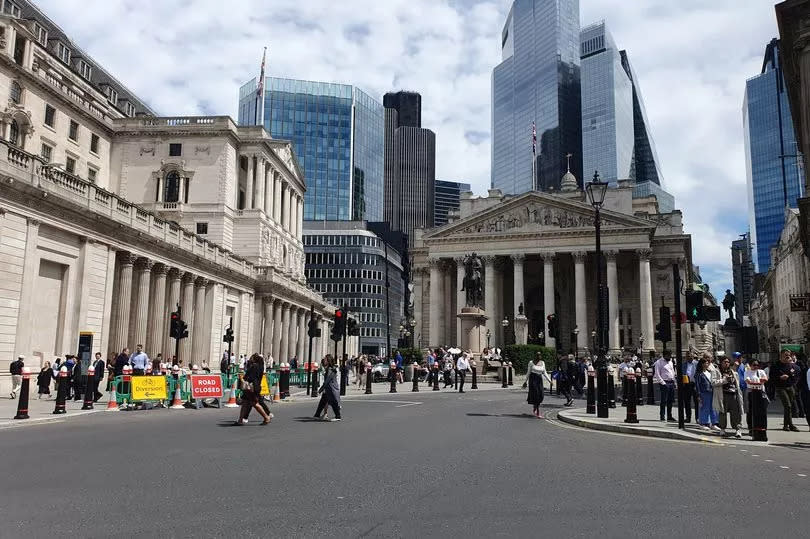London council votes to fully reopen Bank Junction to black cabs for first time in 7 years in trial

The City of London has voted to pursue reopening Bank Junction to Black Cabs during the week on a trial basis. Any changes must go before Transport for London (TfL) before they are implemented, but the decision could mean that taxis are added to the traffic mix at the notorious junction on weekdays for the first time since mid-2017.
The restrictions, which limit Bank Junction to pedestrians, buses and cyclists between 7am and 7pm Monday to Friday, were introduced in a bid to improve safety. At the time of their implementation, Bank was the most dangerous junction in the Square Mile. In 2015, 26-year-old Ying Tao died after being crushed by an HGV while riding to work.
In an occasionally heated Court of Common Council meeting earlier today (June 20), Deputy Shravan Joshi, Chair of Planning and Transportation, began by proposing an amendment to a recommendation from his own Planning and Transportation Committee. That recommendation, agreed at a committee meeting in May and which was to go before the Court, sided with the officers’ advice that the restrictions remain in-place.
READ MORE: London council warned of 'mockery' if it reopens Bank Junction to black cabs on weekdays
His proposed amendment however was to instead have the committee recommend the junction be reopened to Black Cabs on a trial basis, which he said would present members with the opportunity “to have a clear, binary vote in favour of making changes at Bank Junction, or no change however this Court decides”.
Alderwoman Martha Grekos contested this on the basis the amendment ‘negates’ the original motion and so contravened one of the City’s own standing orders, though was told by the Lord Mayor, via the Town Clerk, that the proposed amendment was admissible.
An early point of contention came when Deputy Keith Bottomley, in his speech seconding the proposed amendment, told members that cycling campaigner and prominent opposer of reopening the junction Peter Murray had conceded to him that a trial would be ‘reasonable and harmless’. This was queried by Alderwoman Grekos, who pointed out that Mr Murray was in the room and shaking his head at Deputy Bottomley’s claim.
Common Councillor Natasha Lloyd-Owen was among the members to argue Deputy Joshi’s proposal would set a ‘dangerous precedent’ if approved, with Common Councillor Andrew McMurtrie adding it was ‘unfortunate’ the Planning Chair had put it to the Court. The amendment was however agreed, meaning the substantial vote would be on whether to pursue a trial reopening of the junction to Black Cabs during the week.
Opening the debate, Alderwoman Grekos said she would refrain from making arguments she had aired at previous meetings, and which had been considered thoroughly in the ‘excellent’ report by officers.
“I expect though that this Court will vote today to dilute the current traffic restrictions, not on rational grounds, but because some members have used this issue to raise their political profile, and others have U-turned to preserve theirs,” she said. “I hope members will have the courage today to do the right thing, rather than follow those who hold office as so often happens.”
Alderwoman Grekos further warned that removing restrictions would damage the City’s reputation, adding: “This debate merely provides ammunition for a future Government to wipe the Corporation off the municipal map.”
Common Councillor Oliver Sells meanwhile described the proposed move as a ‘regressive step’, telling members: “Our whole policy has been travelling in this one direction since 2017 when I first came here, and I think it would be perceived today as a retrograde and regressive step, even if we considered a trial of this nature.”
Common Councillor Ruby Sayed was among the speakers to argue in-favour of running a trial on equalities and access grounds. She told the Court that, as someone with mobility issues, chronic pain and other disabilities, she has continually opposed the restrictions as she feared it would be a way of excluding people like her.
“We are restricting so many people with regards to different needs, and we’ve spoken about and we keep championing an inclusive city. That should be inclusive to all. There are so many areas of the city already where people with disabilities…you can’t get to. Why are we discriminating any further?”
Alderman Timothy Hailes, who has previously spoken to the Local Democracy Reporting Service (LDRS) about the scheme, meanwhile pointed to the ‘considerable improvements’ to the public realm around Bank, which he said has already “shifted the balance of priorities in favour of pedestrians, buses and cyclists”.
“I believe [the motion] to be entirely reasonable, proportionate and sensible, and I very much hope that the Court of Common Sense will prevail here this afternoon on this issue.”
Prior to the vote, Deputy Joshi said the whole matter “has clearly shown that there are differing opinions, not just within this Honourable Court, but outside in the real world”, making it important the Corporation remains ‘in-tune’ with its stakeholders.
He added the Court has ‘his assurance as Chairman’ that he will execute its wishes “to the best of my abilities”, regardless of the decision.
A final moment of drama ensued when, following the traditional show of hands which indicated a majority in-favour of pursuing a trial, Deputy Brian Mooney moved for a division, meaning members were to be given electronic items recording each and every vote. The final decision was subsequently finalised as 57 for the trial, 21 voting no, and one member abstaining.
Transport for London (TfL) must also approve the proposal for any changes to be implemented. The City expects the restrictions to be lifted in Spring 2025.
Get the biggest stories from around London straight to your inbox. Sign up to MyLondon's The 12 HERE for the 12 biggest stories each day.

 Yahoo News
Yahoo News 
